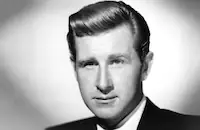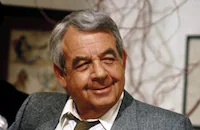To Find a Man
Brief Synopsis
Cast & Crew
Buzz Kulik
Pamela Sue Martin
Darren O'connor
Lloyd Bridges
Phyllis Newman
Tom Ewell
Film Details
Technical Specs

Synopsis
Rosalind McCarthy, a spoiled, self-centered teenager, returns from a Catholic boarding school to her home on New York's upscale Sutton Place for Christmas vacation. Fearing that she is pregnant, Rosalind turns to her neighbor and childhood friend, Andy Morrison, for help, although at first she pretends that it is a friend who is "in trouble." Andy, who is still a virgin and has always loved Rosalind, is dismayed by her condition but helps her approach a friendly pharmacist, Mr. Katchaturian, who is able to confirm her pregnancy. Determined to rid herself of the unwanted baby, Rosalind tries several old wives' tale remedies, such as jumping from ledges, drinking castor oil and douching with soda pop, but nothing works. Andy finds out that a local hospital offers safe and affordable abortions, but when the waiting list proves to be too long, as Rosalind is to leave soon with her parents on a vacation to Acapulco, the teenagers are stymied. After Andy learns about a private but expensive clinic, he presses Rosalind to reveal the father's identity. She confesses that she spent one afternoon making love with Rick, the gigolo boyfriend of a classmate's mother, even though it turned out to be an unpleasant experience. Andy approaches Rick, asking him for money for the abortion, but the callous Rick refuses to help. Andy, whose frantic actions have aroused the suspicions of his devoted but pragmatic housekeeper, Modesta, then pawns his beloved chemistry set, but on his way home, he is mugged and beaten. Modesta gives Andy what little money she has, but, needing more, Andy turns to Rosalind's father Frank, a former bricklayer who has earned a fortune as a contractor. Although Rosalind's mother Betty enjoys their new wealth and avidly pursues social distinction, Frank is ambivalent about their lifestyle and drinks to ease his uncertainties. Having always regarded Andy as a son, Frank is at first proud when Andy confides that he needs money to help a friend get an abortion. When he realizes that the girl in question is Rosalind, however, Frank assumes that Andy is responsible and is crestfallen. After getting the name of a private abortionist from his mistress, Frank gives Andy the necessary funds, then orders him never to come to their home again. Soon after, Andy escorts Rosalind to the physician, Dr. Hargrave, and is stunned by her lack of emotion over the procedure. When they return home, Rosalind casually offers Andy sex as thanks for his help, but Andy, matured and toughened by the ordeal, tells Rosalind that he loves her, then walks away.

Cast
Pamela Sue Martin
Darren O'connor

Lloyd Bridges
Phyllis Newman

Tom Ewell

Tom Bosley
Miles Chapin
Schell Rasten
Antonia Rey
Susan Tully
Crew
Mort Abrahams
Margaret Booth
Stanley Cappiello
Peter Dohanos
Marion Dougherty
Bill Farley
Charles Federmack
Wayne Fitzgerald
Ed Folger
Philip M. Goldfarb
Alixe Gordin
Alan Hicks
Bob Laden
Andrew Laszlo
Milo Lory
Ruth Morley
Arthur Piantadosi
Irving Pincus
Barbara Robinson
Warren Robinson
Rita Roland
Everett Rosenthal
William Saracino
Arnold Schulman
Joe Scully
David Shire
Peter Skolnik
Ray Stark
Barbara Tindall

Film Details
Technical Specs

Articles
Ray Stark (1915-2004)
Born on October 3, 1915 in New York City, Stark was educated at Rutgers University and New York University Law School. After graduation, he started his entertainment career selling radio scripts before he became a literary agent for such notable writers as Ben Hecht, Thomas P. Costain, and Raymond Chandler. After serving in the Navy during World War II, Stark - who had show-business connections through his mother-in-law, Broadway legend Fanny Brice - eventually became a top Hollywood agent at Famous Artists, where he represented such stars as Marilyn Monroe, William Holden, Kirk Douglas, and Lana Turner.
By 1957, Stark was hungry to develop more of a taste in the film business, so he formed a partnership with fellow producer Elliott Hyman to create the independent movie firm, Seven Arts Productions. Stark's first film production credit was the popular drama The World of Suzie Wong (1960) starring William Holden and Nancy Kwan; and he followed that up with an adaptation of Tennessee Williams' superb Night of the Iguana (1964) with Richard Burton, Deborah Kerr and Ava Gardner.
Around this time, Stark had the ambition to produce a musical based on the life of his late mother-in-law, and produced his first Broadway musical - Funny Girl. The musical opened on March 24, 1964 and made Barbra Streisand the toast of the Great White Way. Eventually, Stark would make the film adaptation four years later, and Streisand would win the Academy Award for Best Actress. Stark would also arrange a contract with Streisand to do three more movies for him within the next 10 years that still prove to be the most interesting of her career: the hilarious sex farce The Owl and the Pussycat (1970) with George Segal; the romantic drama The Way We Were (1973) with Robert Redford; and the sequel to her film debut Funny Lady (1975) co-starring Omar Sharif.
Stark also delivered another Broadway luminary to the movie going masses when he brought a string of well-acted, Neil Simon comedies to the silver screen, most notably: The Goodbye Girl (1977) with Marsha Mason and Richard Dreyfuss (Oscar winner, Best Actor); The Sunshine Boys (1975) with Walter Matthau and George Burns (Oscar winner, Best Supporting Actor); California Suite (1978) with Alan Alda, Michael Caine, and Dame Maggie Smith (Oscar winner, Best Supporting Actress); the nostalgic Brighton Beach Memoirs (1986) with Blythe Danner; and Biloxi Blues (1988) with Matthew Broderick. He also produced Steel Magnolias (1989), with an ensemble cast that introduced audiences to a radiantly young Julia Roberts. In television, Stark won an Emmy award for the HBO's telefilm Barbarians at the Gate (1993). His last credit as a producer (at age 84) was the Harrison Ford picture Random Hearts (1999).
Although he never won an Academy Award, Stark earned the most prestigious Irving G. Thalberg Award in 1980 and the David O. Selznick Lifetime Achievement Award from the Producers Guild of America in 1999. He is survived by his daughter, Wendy, and granddaughter, Allison.
by Michael T. Toole

Ray Stark (1915-2004)
Quotes
Trivia
Notes
According to Filmfacts, after the film's initial theatrical engagements, as well as its showing at the Cannes Film Festival in 1972, it was distributed under the titles The Boy Next Door and Sex and the Teenager. Information on the MPAA website states that the picture was originally rated R in 1971 but was re-edited in order to receive a GP rating.
According to 1969 news items, the rights to S. J. Wilson's novel were purchased by Columbia Pictures in January 1969. In February 1969, Variety reported that the purchase was overseen by former New York Times critic Bosley Crowther, who left his longtime post at the newspaper to work as a story consultant and editor for Columbia. Later 1969 news items noted that the project was to be produced for Columbia as the first joint venture for Phil Feldman Productions and Rastar Productions, which was headed by Ray Stark. In October 1969, Hollywood Reporter announced that Arnold Schulman would make his directorial debut with To Find a Man, and that production would begin in December 1969. Although Schulman did write the picture's screenplay, he was replaced as director by Buzz Kulik in early March 1971, according to a Hollywood Reporter news item. It has not been determined how much of the footage directed by Schulman was used in the completed picture.
In a March 1972 Hollywood Reporter interview, producer Irving Pincus related that filming of the picture was delayed for so long because of the legalization of abortion in New York City in 1970, which occurred during pre-production. As a result, the screenplay had to be revised, as the original conflict arose because the leading female character could not obtain a legal abortion. According to the article, it was suggested by Columbia executive Gerald Ayres that the filmmakers solve the problem by lowering the age of the protagonists to mid-teens, thereby heightening the drama.
Filmfacts also reported that by the time the picture began production in February 1971, Phil Feldman and his production company were no longer involved with the project, and Lloyd Bridges had replaced James Broderick in the role of "Frank McCarthy." According to a March 1971 Daily Variety article Rita Gam had been signed to play "a wealthy ex-model involved with a young lover," but there is no confirmation from contemporary sources that she appeared in the completed picture. Additionally, actresses Heather MacRae and Judith Searle were "apparently replaced or edited out of the final print," according to Filmfacts. A January 1971 Daily Variety news item announcing Searle's casting stated that she would portray "a wealthy divorcee." Modern sources include Vicki Sue Robinson in the cast.
Although a July 1971 Daily Variety news item announced that Helen Reddy had been signed to compose and sing a title song for the picture, no post-production contemporary sources confirm her involvement with the project. As noted by contemporary sources, the picture was shot on location in New York City and Dobbs Ferry, CT, with interiors filmed at the F&B Ceco Studios in New York City. To Find a Man marked the motion picture debut of Pamela Sue Martin, and was the only film featuring Darren O'Connor.

Miscellaneous Notes
Released in United States Winter January 1, 1972
Released in United States Winter January 1, 1972













